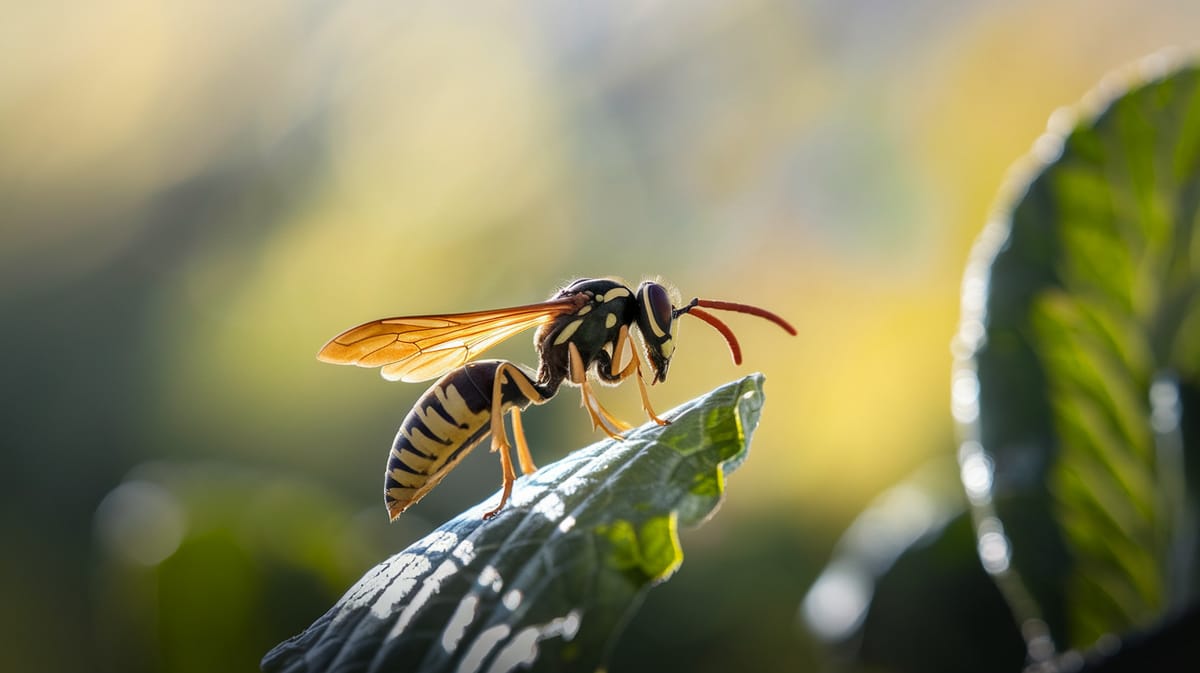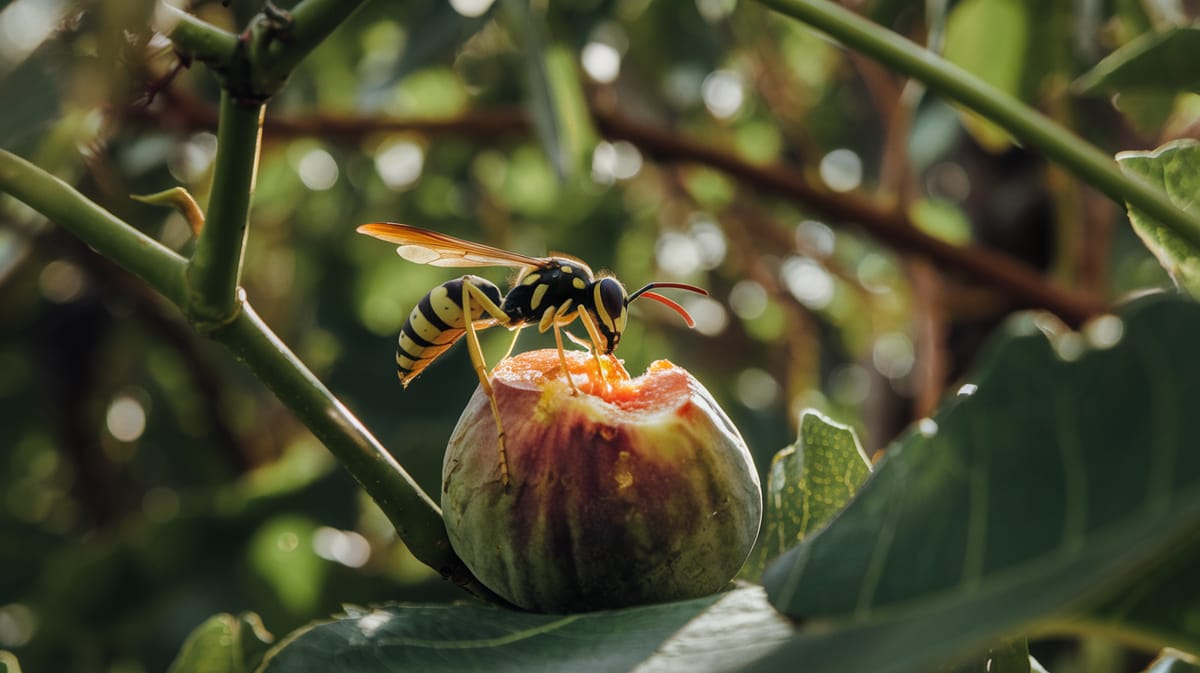Paper Wasp
Architects of intricate nests, paper wasps display social cooperation and efficiency. They play a crucial role in controlling pest populations, benefiting gardens and ecosystems alike.

Key Insights at a Glance
Did You Know?
Taxonomy & Classification
Paper wasps, known for their social structure and versatile nesting skills, are key contributors to ecosystems through their pollination and pest control roles. Let's understand the evolutionary journey and classification of these remarkable pollinators, predators.
Species Diversity
The Polistes genus includes over 300 species distributed globally, thriving in diverse environments and exhibiting varied nesting behaviors.
Evolutionary Resilience
Originating over 100 million years ago, paper wasps have adapted to climate shifts, maintaining their ecological roles through major environmental changes.
Lifecycle and Growth
A remarkable journey of transformation from Egg to Adult.
Egg
Eggs are laid within hexagonal cells of the nest, where they remain until hatching into larvae.
Larva
Larvae are fed by adult wasps and undergo rapid growth, shedding their skin multiple times.
Pupa
Enclosed in a protective cocoon, the pupa undergoes metamorphosis, transforming into an adult wasp.
Adult
Emerging as fully developed wasps, adults take on roles such as foraging, nest building, and colony defense.
Dietary Habits
An adept forager with versatile feeding habits, this insect includes insects, nectar, and plant material in its diet.
| DIET TYPE | DESCRIPTION |
|---|---|
| Primary Diet | Primarily feeds on caterpillars, flies, and other insects, using its powerful mandibles to capture prey. |
| Secondary Diet | Supplements diet with nectar and honeydew, providing necessary carbohydrates for energy and colony maintenance. |
| Occasional | Occasionally scavenges on carrion or plant matter, adapting to available resources in its environment. |

Behaviour and Adaptations
Discover the incredible adaptations that equip the Paper Wasp to thrive in its environment.
Nest Construction
Builds durable paper nests using chewed plant fibers and saliva.
Social Coordination
Operates within complex colonies with roles like foragers and guards.
Defensive Stinging
Uses powerful stings to protect the colony from threats.
Ecosystem Impact
Supporting ecological balance through the Paper Wasp's multifaceted roles.
Natural Pest Control
Paper Wasps help control pest populations by preying on caterpillars and other insects.
Pollination Partner
Contributes to pollination by visiting flowers for nectar.
Biodiversity Booster
Supports biodiversity by providing food for birds and other predators.
Conservation Challenges
Understanding and addressing the major threats to Paper Wasp populations.
Habitat Loss
Urban development reduces nesting sites and foraging areas for Paper Wasps.
Chemical Exposure
Pesticides and pollutants disrupt wasp health and reproductive success.
Climate Change
Weather pattern shifts alter foraging and nesting, impacting survival.
Frequently Asked Questions
How long do Paper Wasp live?
Paper wasps generally live for about 3 to 4 months. Queens from the colony can survive longer, overwintering to start new colonies in spring. Worker wasps and males have shorter lifespans, usually only living until the end of the summer season.
What do Paper Wasp eat?
Paper wasps primarily feed on nectar and other sugary substances. They also hunt caterpillars and other soft-bodied insects to feed their larvae, playing a crucial role in controlling pest populations. Adult wasps provide chewed prey to their young in the nest.
Are Paper Wasp poisonous?
Paper wasps are not poisonous, but their stings can be painful and cause allergic reactions in some people. They use venom to subdue prey and for defense. While not deadly, stings can cause swelling, itching, and discomfort. Medical attention is advisable if allergic reactions occur.
Are Paper Wasp endangered?
Paper wasps are not considered endangered. They are widely distributed and adaptable, thriving in various environments. While local populations might face threats from habitat loss or pesticide use, overall, paper wasps are not at risk of extinction globally.
What do Paper Wasp symbolize?
Paper wasps often symbolize productivity, teamwork, and social structure due to their organized colonies and diligent work habits. They can also represent communication and cooperation, highlighting the strong social bonds and division of labor within their communities.
Do Paper Wasp bite?
Paper wasps do not bite humans; they sting instead. Their sting can be painful and is used for defense and predation. Unlike some bees, paper wasps can sting multiple times. Their stingers deliver venom, which can cause irritation and swelling.
What color are Paper Wasp?
Paper wasps are typically black or dark brown with yellow or red markings. Their coloration can vary between species, but they often have distinctive stripes or patterns that serve as a warning to predators, indicating their ability to sting.
Does a Paper Wasp have wings?
Yes, paper wasps have wings. They possess two pairs of membranous wings that enable them to fly. Their wings are long and often folded longitudinally when at rest. These wings play a crucial role in foraging and defending their nests.
What does a Paper Wasp look like?
Paper wasps have slender, elongated bodies with narrow waists. They feature two pairs of wings and long, dangling legs. Their coloration is typically black or brown with yellow or red markings. They build open, umbrella-shaped nests from chewed wood fibers mixed with saliva.
Is a Paper Wasp an insect?
Yes, a paper wasp is an insect. It belongs to the order Hymenoptera, which includes bees, ants, and other wasps. Like all insects, paper wasps have a three-part body structure: head, thorax, and abdomen, along with six legs and two antennae.
Related Insects
Discover insects with similar characteristics to Paper Wasp - including shared habitats, diets, and taxonomic classifications
Share this profile
Help others discover Paper Wasp
